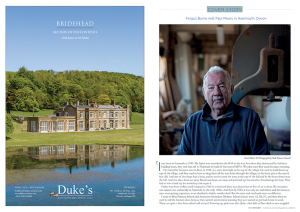© Photograph by Tula Youens-Stunell

I was born in Exmouth in 1945. My father was seconded to the RAF in the war, but when they discovered he had been building boats, they sent him off to Topsham to build 65 foot carvel MFVs. Wooden ones they used for mine sweeping.
He started his business over in Beer, in 1945, in a corn shed right at the top of the village. He used to build boats up top of the village, and they used to have to drag them all the way down through the village; so the boats got to the top of Sea Hill. And one of the chaps had a lorry, and he used to park the lorry at the top of the hill and let the boats down over the hill. And one day a boat ran away. Brand new boat, ran away and smashed up two winches. Smashed up the boat. They had to tow it back up the workshop and repair it.
Father was there in Beer until I started in 1960 in a shed and there was about four or five of us in there. We moved to our current site, technically in Axmouth, in the early 1960s. And then by 1983, it was only me and father, and the business rates were getting expensive, so we decided to build a smaller shed. But the rates and overheads were no different.
I went to Beer Primary School and Axminster Secondary Modern. School classes were 1A, 1B, 1C, and then what we used to call the farmers class, because they weren’t interested in learning, they just wanted to get back home to work. There are quite a few from school still around. Growing up, polio was rife. Quite a few kids in Beer died or were crippled with it. And I remember milk shortages. At one time at school, we used to have milk tablets, and they were bloody delicious.
I started in the yard at 15. Not long after, we were installing a Brit engine (made in Bridport), a 1620 Brit, into a boat. We had no lifting gear, so we had to man-handle the boat and engine. It was probably 5 or 6 hundredweight. Anyway, we would normally get the engine in over on the gunwale, and we were just sliding it up a plank, and I’m down at the bottom pushing, and all of a sudden the plank slides away and the engine runs onto my leg. It broke in two places, and I was in the hospital for two or three weeks. But you know what? We had been struggling to lift that engine, but when it landed on me, they lifted it off like it wasn’t there!
I mean, everything was different then. Prices were different, and you had to work harder, really bloody hard work. I can remember sitting under a boat for three or four days with a hand plane upside down, cleaning off the bottoms of boats. Brand new boats, getting them nice and smooth. We mostly built new boats in those days. The ribs were all steamed around. They were so tough, I don’t know how we did it. I couldn’t do it now. We did some repairs, but it was before fiberglass, so you had wood or nothing. I enjoyed it, we were never going to make a fortune, but it’s a way of life. I have an iPad thing now, but I don’t know what to do with it.
It was mostly builders, farmers and fishermen living around here. But growing up in Beer we had two chemists, two butchers, a delicatessen and a greengrocer. There was a shoemaker, a fish shop, two bakers, a wine shop, a toy shop, and a tailor. Then there was the quarry for work, and everywhere did bed and breakfasts. My mother did bed and breakfast. And there was a doctor’s surgery. You could call a doctor and he’d come out at 10 o’clock at night. Now, if I try to make an appointment. I have to wait a month.
I can remember we used to sell a lot of boats to Lyme Regis, to people with plenty of money. And at the end of the season, we would collect them, bring them back here, look after them, service them, and do the decorating and stuff like that. And we used to come back, usually in convoy, because we knew somebody was going to break down! And I remember coming in the river mouth once, and my engine had stopped, and one bloke was towing me, and the wind got up so much I was six feet up looking down on him. That’s the nearest I’ve ever come to shit myself. There’s another bloke had a boat on Seaton beach and he used to get pissed out of his brains, and he come in one day from sea, and he put into Beer and he threw the anchor over, and he went over with it. The boat was still moving, and it ended up going round and round in circles with him, still with his thigh boots on. Luckily enough, somebody was on the shore and they went out and collected him or he’d be going round and round forever.
We used to build for West Bay, Lyme Regis, Beer, Sidmouth, I think the furthest away we’ve built one was for Aberystwyth in Wales. We built one for Salcombe (Granite State) and that ended up on the Isle of Ulva in Scotland. That boat would have cost about 2 to £3,000 when it was built in the seventies. It would cost about £200,000 now.
I remember when we built the 35-footer that went to Aberystwyth (Western Seas). It had a 12-foot six-beam, and it was 11 foot across the transom. And the day came when we had to go out on sea trials, and I said, it’s too rough to go but Mr Shears from the ‘White Fish Authority’ (Inspector of new fishing boats at the time) insisted on going out. Anyway, we were bouncing up and down, and then he wanted to turn the boat around and go astern. I said what into these waves? He said, yeah. We went into the waves, and they were crashing over, and that went on for probably half an hour. I didn’t know if the boat was going to survive. Anyway, in the end, it was too rough to get back into the Axe, and we had to go to Lyme Regis and leave her up there for about a week.
Fishing’s changed obviously. Years ago, it was guesswork and knowledge. Nowadays they’ve got the machinery to tell them there’s one fish or that there’s a shoal of fish. They just scoop them all up. And I mean, to me, the worst type of dredging is scallop dredging, where they got these dredges going along the seabed, and it kills everything, and it just ruins the seabed.
My son Alex started in 2004, and not that long ago, he was working on a boat and accidentally ignited some acetone vapour with a hot air gun. And boom! Suddenly, he was in a ball of flames! He leapt down over the side of the boat with skin hanging over his arms like ribbons. The air ambulance came for him, but they couldn’t take him to Bristol because the fog was too thick. So his partner took him home and gave him a cold shower. Then they took him to Exeter, where they couldn’t deal with it because it was too bad. So they took him up to Bristol burns unit, and he was there for two or three weeks. I managed to put the fire out with two fire extinguishers before the fire brigade came down.
I was never going to do anything else but boat building. My father offered to send me to Southampton to study naval architecture when I was 15, but I didn’t want to leave home. All three of our boys went to university. The eldest is a chartered building surveyor, the middle one is a doctor in the RAF, and Alex has a degree in structural engineering.
I still like making little bits and pieces of furniture and stuff like that, but I had a triple heart bypass about 18 months ago. Then I had a bloody heart attack after that, and they had to put a stent in. But there’s a chap over in Beer who had pioneering surgery in 1983. He had a quadruple heart bypass in London, and he’s still going at 93!
As long as Alex wants to carry on, I’m happy to keep coming down here. He keeps the company going now. I do odd jobs, but nothing too wearing.



